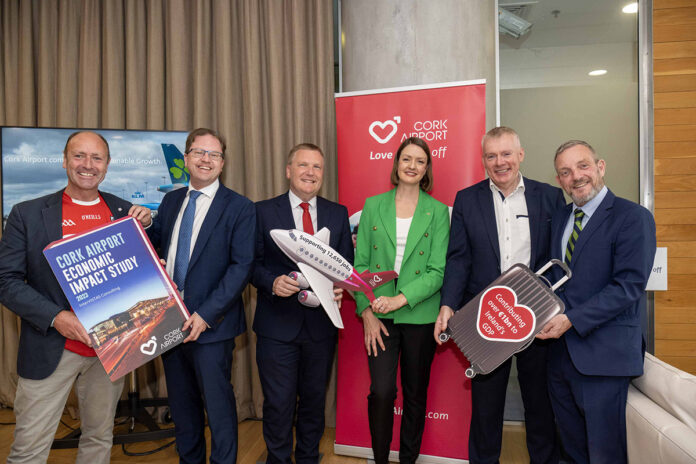
€1.045 billion was contributed by Cork Airport to the Irish economy and more than 12,650 jobs were supported in 2023, new analysis of the airport’s economic impact has revealed.
The analysis by InterVISTAS Consulting, launched on Monday, shows that Cork Airport plays a critical role in supporting jobs in tourism and trade across the south of Ireland as a key economic enabler for industry and commerce.
Day-to-day operational activities at the airport directly supported 2,330 jobs in companies across the airport campus including airlines, air traffic control, ground handlers, airport security, immigration, customs and airport retailers last year. While an additional 10,320 jobs stemmed from the indirect, induced, and catalytic impacts of the airport’s operations.
CONNECTIVITY
The analysis included examination of the connectivity of Cork Airport. The 2023 IATA Connectivity Index, which measures the international access from an airport to the global economy, shows that Cork Airport is the best-connected airport in the Republic outside of Dublin. The range and density of the airport’s network, including services to major hubs such as London Heathrow and Amsterdam, provides the region with high levels of connectivity and enables easier links to the wider world.
To promote enhanced connectivity and traffic growth, Cork Airport announced on Monday that airlines will be encouraged to move seat capacity to Cork from Dublin by way of discounts on airport charges at the southern airport.
IMPORTANT ROLE
“Cork is a really great airport and daa is committed to supporting its growth to five million passengers a year within the next decade, while maintaining the warm Cork welcome and customer service our passengers know and love Cork for,” Kenny Jacobs, CEO daa said, speaking at the study launch. “Cork Airport will continue to expand its route network, including offering new incentives to encourage airlines that are capped from growing at Dublin to take advantage of Cork Airport’s great facilities.”
“Good connectivity throughout the island is critical to attracting tourists and investment to Ireland and there is a real danger of losing out to other countries while the Dublin cap remains in place. Airlines that move routes and traffic from Dublin to Cork Airport will be offered lower charges at Cork Airport to encourage airlines to keep those routes in Ireland and to support jobs and connectivity.”
CONTINUED TOURISM GROWTH
Welcoming the figures, Alice Mansergh, Chief Executive, Tourism Ireland said that they welcome the collaboration with the airport to continue growth to the region.
“At Tourism Ireland, we market the island of Ireland overseas to inspire visitors to come here, helping economies and communities to thrive. Overseas tourism to Cork city and county alone brings in excess of €600 million to the region per annum. As always on our island, air and sea access are vital. We are proud to partner with Cork Airport, regional airport partners across the island, as well as air and sea carriers, to support demand for routes that bring inbound visitors to us.
“Alongside our programme of advertising and publicity, partnerships play an important role as we seek to grow overseas tourism revenue to Ireland by +5.6% on average each year to 2030. We thank all at Cork Airport for the warm welcome they offer visitors and for the impactful role they play, and we look forward to continued collaboration and growth ahead,” she said.
The Cork Airport Economic Impact Study was launched by Minister of State for Transport James Lawless TD, Ireland’s EU Commissioner Designate, Michael McGrath TD and Tourism Ireland’s chief executive, Alice Mansergh.







